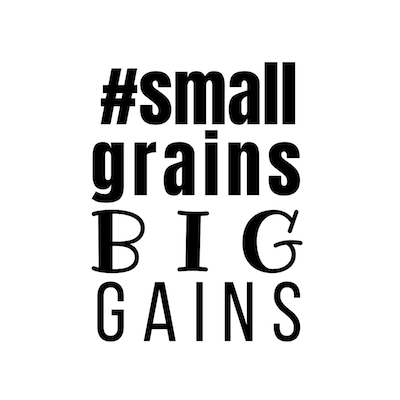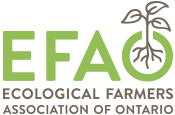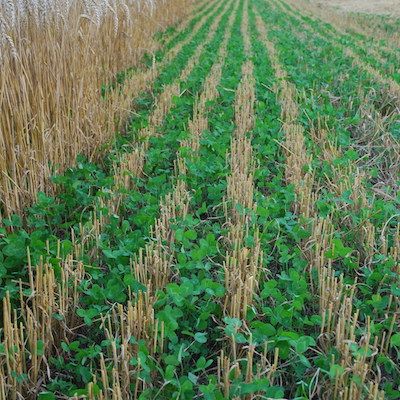EFAO is excited to launch a pilot Small Grains Program that will support Ontario farmers wanting to diversify their crop rotation by adding a small grain followed by a legume cover crop or forage crop. Funded by the Weston Family Foundation, the pilot includes payments of $40/acre for up to 100 acres, as well as participation in the Small Grains Network for training and farmer-to-farmer support and information about small grains production and marketing.
You can learn more about program details at efao.ca/small-grains. In this blog we want to tell you a bit more about the background on this new initiative.
What inspired this project?
In 2019, the Weston Family Foundation (then called The W. Garfield Weston Foundation) invited EFAO to put forward a proposal to help broaden the adoption of ecological farming practices through payments to farmers for implementing a new practice, in combination with farmer-to-farmer knowledge sharing and mentorship.
While EFAO has not previously delivered payment-type programs, we were interested in the opportunity as it aligned very well with one of the recent strategic goals identified by the EFAO Board of Directors: to broaden adoption of ecological agriculture among other farmers.
We also felt that such a project would respond to one of the policy priorities that we were advocating for through our work in Farmers for Climate Solutions. This farmer-led campaign recently released five recommendations for the federal government to help farmers cope with the twin challenges of COVID-19 and accelerating climate change. One of these policy recommendations is to provide incentives for climate-friendly farming.
Why small grains?
As we looked to the work and experience of other farm organizations, we came across Practical Farmers of Iowa’s Small Grains Cost-Share Program. Having already been inspired by PFI in developing EFAO’s Farmer-Led Research Program, we were intrigued! We learned that PFI has supported the adoption of small grains on over 10,000 acres in just 4 years, helped farmers find markets for their grains and more than doubled the PFI network of ecological growers in Iowa.
Diverse crop rotations are a core principle of ecological farming – and small grains such as wheat, spelt, oats, barley, rye or triticale are central to diverse crop rotations. In short, small grains have big gains. Adding small grains such as wheat, spelt, oats, barley, rye or triticale to a 2-year corn/soybean rotation not only supports higher corn and soybean yields and profitability, but also improves soil health and water quality, reduces inputs, diversifies farm income and labour requirements and increases resilience of Ontario’s rural communities. And as always, diversity begets diversity – small grains are a critical component to integrating livestock back on the landscape: the grain crop is feed and straw and the cover crop can be forage.
Focusing on small grains also allows us to build on and further collaborate with the Bauta Family Initiative on Canadian Seed Security’s Participatory Plant Breeding (PPB) program, that has been working with farmers to breed new wheat and oat varieties that are adapted to ecological farming conditions, in addition to supporting farmers with training and networking in small grains production.
Doesn’t small grain production promote the use of herbicide and fungicide?
While conventional small grains production uses herbicides and fungicides, there is a robust body of research that shows that diversifying a crop rotation with small grains – both conventionally and organically – has a myriad of benefits.
- Small grains reduce pesticide use: Because diverse rotations can control weeds with up to 6 times less herbicide use, their potential freshwater ecotoxicity is up to 200 times lower than that of a simple corn-soybean rotation.
- Small grains help protect and build soil health: A diversity of crops results in a diversity of roots, which provide food and habitat for soil organisms. Diverse roots and soil microorganisms improve soil structure, increase organic matter and help prevent erosion.
- Small grains improve water quality: Since small grains are cool season crops, small grains keep roots in the ground year round. They capture and use nitrate-rich water from the soil and, in turn, prevent nutrient run-off and erosion.
- Small grains reduce GHG emissions and fossil energy use: Small grains are harvested in the summer, which allows farmers to grow legume cover crops and forages in the same season. From the nitrogen fixed by the microbes associated with the legumes, farmers can credit the following (corn) crop and decrease the amount of fertilizer they buy. Reduced fertilizer leads to reduced greenhouse gas emissions and less fossil energy use; and lower cost of production for the farmer.
Is this program relevant to EFAO members?
This program is open to all farmers, including EFAO members. While the payment rate is likely more enticing to cash crop farmers who are looking to include a small grain for the first time, all farmers interested in diversifying their rotations with the addition of a new small grain (and cover crop) are welcome to apply. This includes vegetable farmers wanting to add a grain share to their operation, or smaller-scale diversified farmers who want to learn how to grow artisan grains, for example.
At the heart of this program is the coordination of a Small Grains Network of farmers across Ontario, that will provide training and farmer-to-farmer knowledge sharing opportunities. We hope that this program and network will provide a pathway to ecological farming practices for farmers who may not otherwise explore them, and we look forward to welcoming new faces to EFAO. We also expect that EFAO members will be a big part of this network – benefiting from the learning opportunities and providing mentorship to fellow new ecological farmers.
Where can I learn more?
Please share program information with anyone you know who might be interested, including EFAO’s #smallgrainsbiggains campaign on social media.
If you have any questions, suggestions or comments about this new program, please contact Maureen Balsillie, maureen@efao.ca.

FUNDING
This program is made possible by funding from the Weston Family Foundation.

